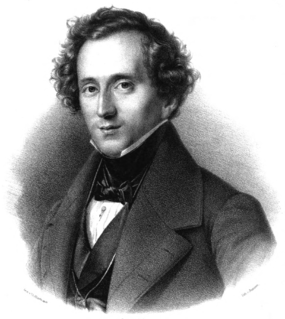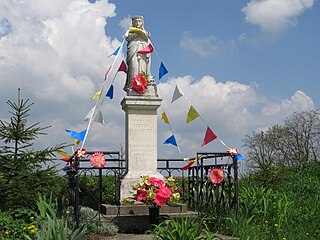Related Research Articles

Jakob Ludwig Felix Mendelssohn Bartholdy, born and widely known as Felix Mendelssohn, was a German composer, pianist, organist and conductor of the early Romantic period. Mendelssohn's compositions include symphonies, concertos, piano music, organ music and chamber music. His best-known works include the overture and incidental music for A Midsummer Night's Dream, the Italian Symphony, the Scottish Symphony, the oratorio St. Paul, the oratorio Elijah, the overture The Hebrides, the mature Violin Concerto and the String Octet. The melody for the Christmas carol "Hark! The Herald Angels Sing" is also his. Mendelssohn's Songs Without Words are his most famous solo piano compositions.

The University of Music and Theatre "Felix Mendelssohn Bartholdy" Leipzig is a public university in Leipzig. Founded in 1843 by Felix Mendelssohn as the Conservatorium der Musik , it is the oldest university school of music in Germany.

Kurt Wilhelm Sebastian Hensel was a German mathematician born in Königsberg.

Lobgesang, Op. 52, is an 11-movement "Symphony-Cantata on Words of the Holy Bible for Soloists, Choir and Orchestra" by Felix Mendelssohn. After the composer's death it was published as his Symphony No. 2 in B-flat major, a naming and a numbering that are not his. The required soloists are two sopranos and a tenor. The work lasts almost twice as long as any of Mendelssohn's purely instrumental symphonies.

Psalm 42, Op. 42 Wie der Hirsch schreit is a cantata by Felix Mendelssohn, setting Psalm 42 in German. It was written and published in 1837 for soloists, mixed choir and orchestra.
Felix Mendelssohn's Piano Quartet No. 1 in C minor, Op. 1, for piano, violin, viola and cello was completed on 18 October 1822 and dedicated to Polish Prince Antoni Radziwiłł. Mendelssohn's three numbered piano quartets were the first works of his to be published, hence their opus numbers.

The Clarinet Sonata in E-flat major is a composition for clarinet and piano by Felix Mendelssohn.
MWV may refer to:

Psalm 115 is the 115th psalm of the Book of Psalms, beginning in English in the King James Version: "Not unto us, O LORD, not unto us, but unto thy name give glory". It is part of the Egyptian Hallel sequence in the fifth division of the Book of Psalms.

The Felix Mendelssohn Bartholdy Foundation is a not-for-profit independent foundation governed according to civil law. It is based in the Mendelssohn House in Leipzig.

Lord, have mercy upon us, WoO. 12, MWV B 27, is the incipit of a motet for choir a cappella in both English and German composed by Felix Mendelssohn in 1833. It is also known in English as Responses to the Commandments, and in German as Zum Abendsegen. It was published in 1842, both in English and German, and by Breitkopf & Härtel in 1875 in the complete edition of the composer's works.

Denn er hat seinen Engeln befohlen, MWV B 53, is the incipit of a motet for an eight-part choir a cappella by Felix Mendelssohn. He wrote it in 1844 for the Berlin Cathedral, setting verses 11 and 12 from Psalm 91. Later, Mendelssohn made the motet with accompaniment part of his oratorio Elijah. It was published in 1844, and by Breitkopf & Härtel in 1875 in the complete edition of the composer's works.
Peter Bruns is a German cellist and university professor.
Christian Martin Schmidt is a German musicologist and music theorist.
Friedhelm Krummacher is a German musicologist.
Rudolf Elvers was a German musicologist and librarian. He was particularly concerned with the work of Felix Mendelssohn Bartholdy.
Wulf Konold was a German musicologist, dramaturge and theatre director.

Wer bis an das Ende beharrt, is a motet for a four-part choir by Felix Mendelssohn. He wrote it as part of his oratorio Elijah, published in 1847.

Die Deutsche Liturgie, MWV B 57, is a collection of musical settings of the ten sung elements in the Protestant liturgy, composed by Felix Mendelssohn for double choir a cappella. He wrote it in 1846 for the Berlin Cathedral, on a request by the emperor, Friedrich Wilhelm IV of Prussia. It was published by Breitkopf & Härtel in 1875 in the complete edition of the composer's works.
References
Notes
Sources
- Ralf Wehner (n.d.). "Felix Mendelssohn Bartholdy: MWV Thematic-systematic Catalogue of the Musical Works (MWV)", SAW website, accessed 23 July 2015
- Ralf Wehner (2009). "Fantasie und Systematik. Zur Konzeption und Erarbeitung des Mendelssohn-Werkverzeichnisses", Denkströme. Journal der Sächsischen Akademie der Wissenschaften, vol. 3 (2009), pp. 77–95, accessed 23 July 2015. (in German)